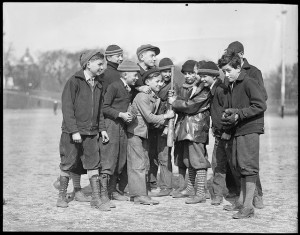Many years ago, the feminist Carol Gilligan made a study of boys at play. She noticed something with which every boy in America is familiar – and I daresay every boy anywhere in the world, in any culture, of any degree of wealth and at any stage of technological development.
Let’s say that boys are playing baseball. There are two outs, the tying run is on third, and the batter slaps a grounder to the shortstop, who fields it in the hole and slings it to first. The play is close. The shortstop says, “Got him!” The batter says, “I’m safe!” The runner crosses the plate. The batter and the shortstop have been needling each other for the last hour, and now their faces are red and their fists are clenched.
What happens?
The boys go through a set of unwritten “rules” that govern such instances. The rules help ensure that hard feelings are averted or deferred, and that the game continues. Here’s how my cousins and neighbors and I would handle it. You appeal first to evidence.
“I fielded the ball clean and threw hard to first,” says the shortstop. “There’s no way you can outrun that! You aren’t that fast.”
“You were clear across the infield,” says the batter. “I beat the throw and that’s that.”
So the evidence is ambiguous. Next comes an appeal to equity.
“Look,” says the shortstop, “we gave you the last two close plays, but you’re not getting this one.”
“You gave us nothing,” says the batter, “and a guy who’s safe is safe no matter how close.”
The batter is being mulish, but he has a point. Next comes an appeal to the Honest Observer.
I’m convinced that there’s an umpire in the soul of every decent boy. There’s something right about the job of an umpire, something even noble. I worked as an umpire one summer when I was a teenager, as did my brother. We enjoyed it, even if the parents could be obstreperous. One of us once ejected a parent from the crowd, under threat of a forfeit by the son’s team. We had the rule book and knew our rights. We gave the kids a generous strike zone, to encourage them to swing and not to wait for walks. That was right, too.

In any case, the Honest Observer replies, “I saw the play, and you were out, Joe” – and Joe and the Honest Observer are teammates. The defense then immediately leaves the field and comes in to bat. Joe grumbles and fetches his glove, and the game continues.
Or the Honest Observer says, “Sorry, guys, but I didn’t see the play.” At this point there are two possibilities. The disputing players can dig in, letting their feelings carry them away. Then the game breaks up. Consider that a kind of death. It is of all things the least desirable, the least admirable. The other possibility involves a useful fiction. The boys pretend that the play never happened. It falls out of existence. They declare a do-over. The batter returns to the plate, and the runner returns to third.
That’s remarkable. A ballgame requires plenty of cooperation and submission to the rules. The competition may be fierce – otherwise where’s the fun? That means that disputes will arise. The boys must have some way of subordinating the individual’s desires to the common good, and such subordination will naturally result in hierarchies, whether of rules to apply, or of judges to acknowledge and obey.
Professor Gilligan saw these things, and noticed that girls behaved quite differently when disputes arose in their play. But instead of reveling in the beauty of sexual difference, and being grateful for boyish displays of chivalry or integrity, she despised them, and said that we need to train boys not to turn to impersonal systems of rules. In other words, we need to force boys to behave as girls do.
Her insane conclusion bears upon the cultural situation in which sane people in general and Christians in particular now find themselves. To look upon boys doing boyish and innocent things, and accomplishing something impressive, and to regard them with disdain or hatred, is a sign of mental and spiritual disease. It would be like seeing a mother rocking her child to sleep, and sniffing at the scene with contempt. It is what Dietrich von Hildebrand would say was a deranged response to value.
If that were all, we could shrug and try to avoid such people when the fit is on them. But it is not all. It cannot be. What Gilligan manifested was a deep disdain for created being, a hatred of the ordinary world as we find it.
That brings me to my point. It’s one thing to dislike something particular or peculiar, say, the music of Wagner. It is another entirely to hate nature – human nature especially. The man who dislikes Wagner may love Puccini. But the man who is set against human nature will know no bounds to his hatred. It will be an all-gnawing acid in his soul. Everything it devours leaves the soul emptier and more ravenous than before.
There will be no end. The pubic Left will not be content to pretend that a man can marry a man, or that a boy who calls himself Lily is a girl, or that a woman who can’t tote her ammunition can be a soldier, or that it’s all right if children grow up without a married mother and father. They hate Nature, but Nature is everywhere about them, above them, below them, and within them.
Imagine being stung to envy or disdain by a boy and girl holding hands. Such people cannot be mollified by political victories. Their hatred of God’s creation ex nihilo aims ultimately ad nihilem. Milton’s Satan: “Only in destroying I find ease / To my relentless soul.”














